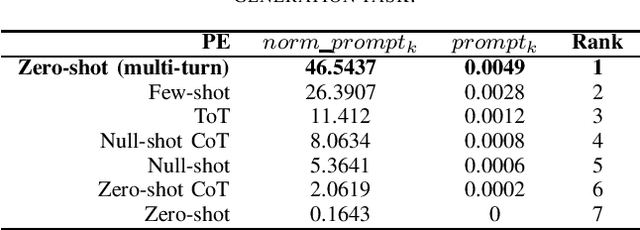Mury F. Dewantoro
ChatGPT4PCG 2 Competition: Prompt Engineering for Science Birds Level Generation
Mar 05, 2024


Abstract:This paper presents the second ChatGPT4PCG competition at the 2024 IEEE Conference on Games. In this edition of the competition, we follow the first edition, but make several improvements and changes. We introduce a new evaluation metric along with allowing a more flexible format for participants' submissions and making several improvements to the evaluation pipeline. Continuing from the first edition, we aim to foster and explore the realm of prompt engineering (PE) for procedural content generation (PCG). While the first competition saw success, it was hindered by various limitations; we aim to mitigate these limitations in this edition. We introduce diversity as a new metric to discourage submissions aimed at producing repetitive structures. Furthermore, we allow submission of a Python program instead of a prompt text file for greater flexibility in implementing advanced PE approaches, which may require control flow, including conditions and iterations. We also make several improvements to the evaluation pipeline with a better classifier for similarity evaluation and better-performing function signatures. We thoroughly evaluate the effectiveness of the new metric and the improved classifier. Additionally, we perform an ablation study to select a function signature to instruct ChatGPT for level generation. Finally, we provide implementation examples of various PE techniques in Python and evaluate their preliminary performance. We hope this competition serves as a resource and platform for learning about PE and PCG in general.
ChatGPT4PCG Competition: Character-like Level Generation for Science Birds
Mar 28, 2023



Abstract:This paper presents the first ChatGPT4PCG Competition at the 2023 IEEE Conference on Games. The objective of this competition is for participants to create effective prompts for ChatGPT--enabling it to generate Science Birds levels with high stability and character-like qualities--fully using their creativity as well as prompt engineering skills. ChatGPT is a conversational agent developed by OpenAI. Science Birds is selected as the competition platform because designing an Angry Birds-like level is not a trivial task due to the in-game gravity; the playability of the levels is determined by their stability. To lower the entry barrier to the competition, we limit the task to the generation of capitalized English alphabetical characters. Here, the quality of the generated levels is determined by their stability and similarity to the given characters. A sample prompt is provided to participants for their reference. An experiment is conducted to determine the effectiveness of its modified versions on level stability and similarity by testing them on several characters. To the best of our knowledge, we believe that ChatGPT4PCG is the first competition of its kind and hope to inspire enthusiasm for prompt engineering in procedural content generation.
 Add to Chrome
Add to Chrome Add to Firefox
Add to Firefox Add to Edge
Add to Edge